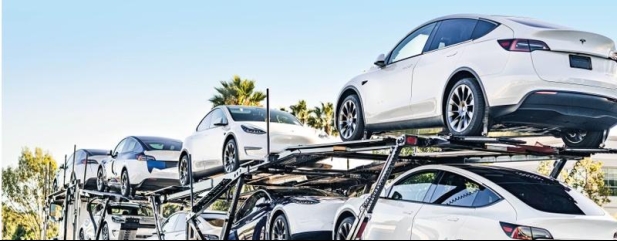Archived article
Please note that tax, investment, pension and ISA rules can change and the information and any views contained in this article may now be inaccurate.
Tesla remains under pressure despite modest beat on quarterly deliveries

The race for pole position in the EV (electric vehicle) market looks to be coming to a head this year with Elon Musk-steered Tesla (TSLA:NASDAQ) on the verge of losing its long-held record of outselling every other manufacturer put together in the US.
In the 12 months to the end of May, Tesla sold roughly 618,000 vehicles in the US whereas its rivals sold a combined 597,000 fully-electric vehicles, according to sales data provider Marklines.
Tesla has had the best-selling EV since 2015 when its Model S surpassed the Nissan Leaf and has sold more EVs than the rest of the industry combined in the US since the launch of the Model 3 in 2018, according to Bloomberg.
The Model Y is now not just the top-selling EV but the world’s top-selling car full stop – however, Tesla’s rivals have been gaining ground relentlessly.
While the US firm’s domestic sales dropped 13% in the first quarter, carmakers Hyundai-Kia (005380:KRX) and Ford Motor (F:NYSE) saw deliveries soar 56% and 86% respectively.
With the release of each manufacturer’s calendar second-quarter sales, analysts will be able to build a clear picture of who is overtaking who.
Tesla reported global deliveries of almost 444,000 vehicles in the three months to June, a drop of around 5% on last year but marginally above the consensus forecast of 439,000 which was enough to spark a 5% rally in the shares.
However, 95% of sales come from just two vehicles, the lower-priced Model 3 and Model Y, revealing the glaring gap in Tesla’s line-up which other car-makers are only too happy to exploit.
Chinese maker BYD (BYDDY:OTCMKTS) posted record June and second-quarter sales, as did XPeng (XPEV:BYSE), Li Auto (LI:NASDAQ) and startup Nio (NIO:NYSE).
Tesla doesn’t just face competition from rival EVs – sales of hybrids now outstrip fully-electric cars as consumers opt for the greater convenience of a petrol engine combined with electric drive.
Carmakers went all-out on battery technology in 2021 believing fully-electric vehicles were the way forward, but getting beyond the early-adopters to the mass-market is proving much harder than they thought as there is still a reluctance to go all-electric due to ‘range anxiety’.
A classic example of the challenges facing EV adoption is rental company Hertz (HTZ:NASDAQ), which bet big on fully-electric cars in 2021, splurging on 100,000 brand-new Teslas to add to its US fleet, only to announce in January this year it was selling off a third of the vehicles due to low customer demand.
Important information:
These articles are provided by Shares magazine which is published by AJ Bell Media, a part of AJ Bell. Shares is not written by AJ Bell.
Shares is provided for your general information and use and is not a personal recommendation to invest. It is not intended to be relied upon by you in making or not making any investment decisions. The investments referred to in these articles will not be suitable for all investors. If in doubt please seek appropriate independent financial advice.
Investors acting on the information in these articles do so at their own risk and AJ Bell Media and its staff do not accept liability for losses suffered by investors as a result of their investment decisions.
 magazine
magazine








